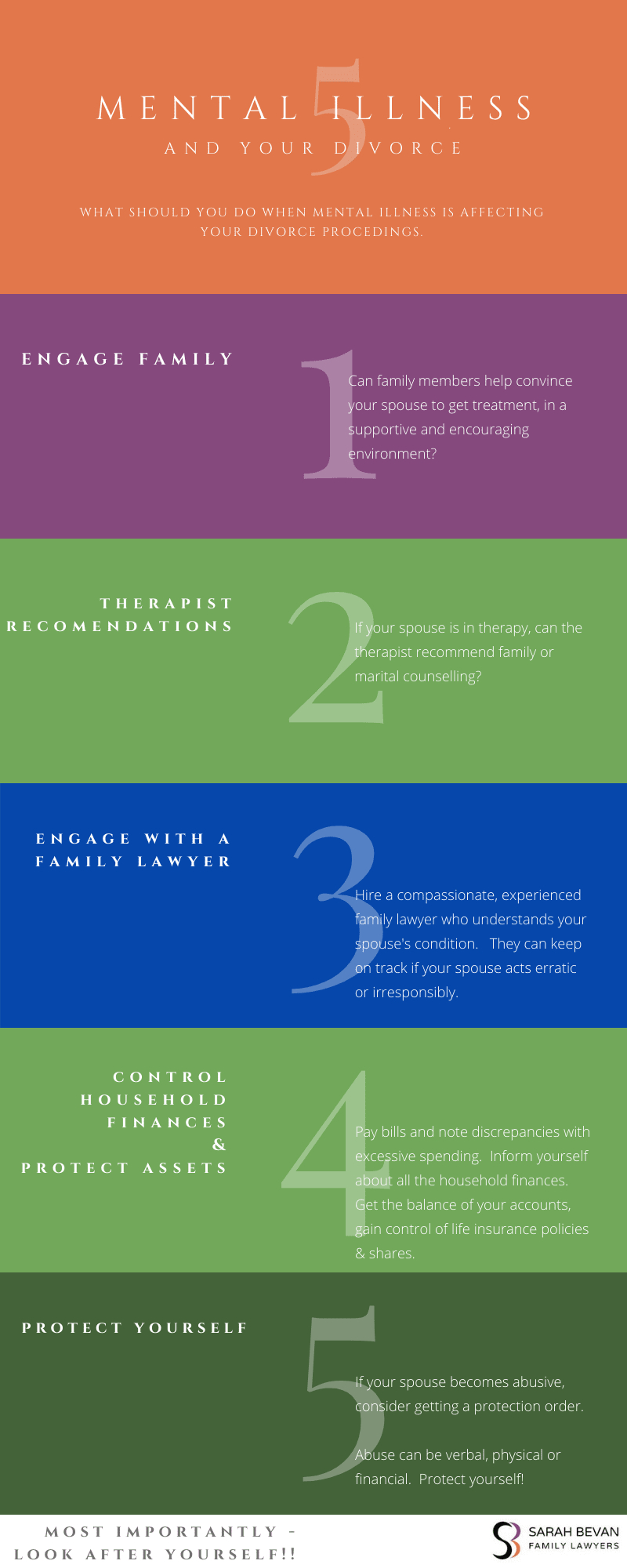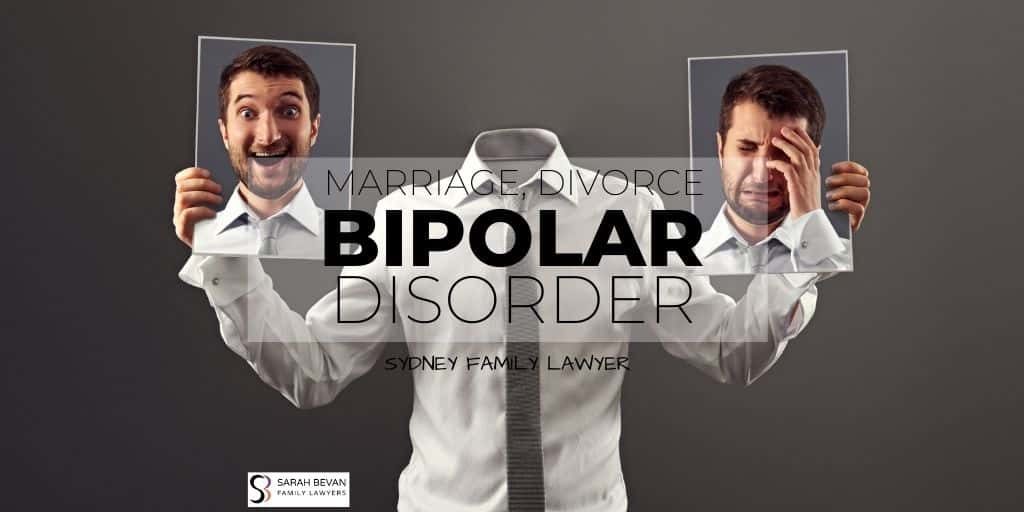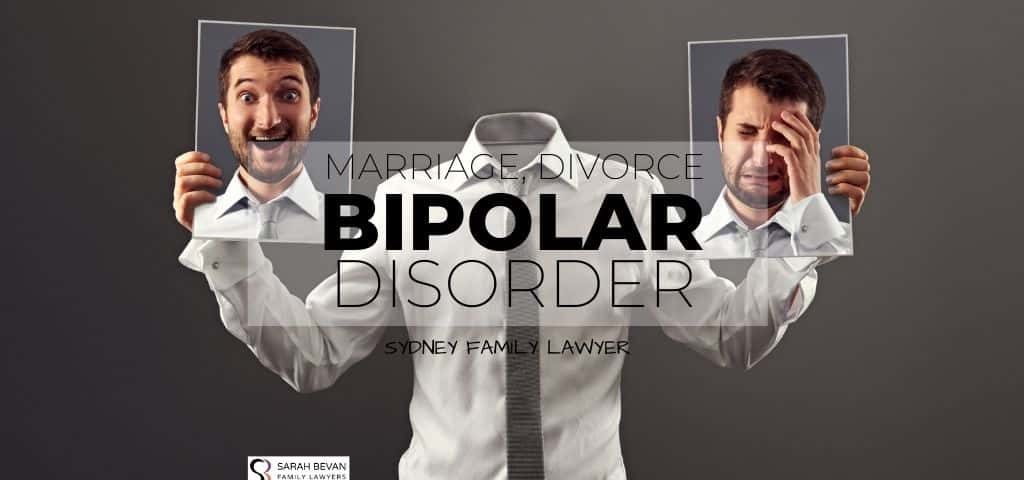- Sydney Family Lawyers
- (02) 9633 1088
- mail@sbfamilylawyers.com.au
Divorce – When Your Spouse Suffers from Bipolar Disorder
Marriage, Divorce and BP (Manic Depressive)
It is estimated that 1 in 3 marriages will end in divorce, here in Australia. More sobering, however, is that it’s thought that up to 9 out of 10 marriages will fail when one partner suffers from Bipolar (BP) disorder.
There are many resources available about bipolar disorder, and the challenges that people affected by this condition face. But there is not much about the unique challenges faced by individuals who are not bipolar themselves but find themselves married to a person who is struggling with bipolar disorder.
How common is bipolar in Australia?
According to the Better Health Channel (Vic), approximately 1.3% of Australians live with a form of bipolar disorder (or Manic Depression). One in 50 adult Australians experience bipolar disorder each year.
Although the number is thought to be much higher than this, due to people not seeking professional help when they are in their ‘euphoric’ (or manic) phase. Instead, believing that they do not have a problem, rather, the problem is everyone around them. It can take around 8 – 20 years to diagnose patients with this condition from the first mood episode to diagnosis.
It is during this period of undiagnosed and untreated mood volatility, that considerable damage can occur both to the individual, their families and of course, YOU the spouse.
What is Bipolar Disorder?
Bipolar disorder, also known as a Manic-Depressive illness, is a serious life-long brain disorder that causes unusual shifts in mood, energy, activity levels, and the ability to carry out day-to-day tasks.
There are four basic types of bipolar disorder; all of them involve clear changes in mood, energy, and activity levels.
These moods range from periods of extremely “up,” elated, and energized behaviour (described as manic episodes) to very sad, “down,” or useless or hopeless periods (known as depressive episodes). Less severe manic periods are known as hypomanic episodes.
For example, a person suffering from Bipolar may struggle to get out of bed or want to do anything for days, despite laying in bed, they may not feel they get the sleep they need.
Quite often, people struggling with BP may be misdiagnosed with depression or another common mental health disorder. Start with a GP or Health Practitioner and be sure to make them aware of the behaviour patterns. It can be extremely dangerous to omit these important signs to a GP or Counsellor, as anti-depressants can be more harmful if prescribed to treat the “depressive” episodes, and could result in an accelerated decline in mood and symptoms.
For some people, episodes can last for 3 – 6 months and may occur every few years, while others may experience shorter but more frequent episodes offer the course of a year.
If this sounds like someone you know, it is important they get the right kind of help.
What is Bipolar I?
Bipolar I disorder is when the person experiences manic cycles (extreme ‘highs’, often with psychotic features) and depressive episodes. The severity and duration of these episodes are often severe and may result in hospitalisation.
What is Bipolar II?
Bipolar II disorder is when the person experiences hypomanic cycles (less severe ‘highs’ with no
psychotic features) and depressive episodes.
How is bipolar diagnosed?
Bipolar disorder only becomes apparent after a person has displayed a full episode of depression and mania or depression and hypomania.
Men and women are equally likely to develop bipolar disorder, and all ethnicities and classes of people are affected. The typical onset age is 25, though it can start in childhood or even after the age of 50.
The hallmarks of untreated mania include hyper-sexuality, anger, impulsiveness and grandiosity, substance abuse, and compulsive behaviour.
What are the signs of a manic episode?
According to the Mayo Clinic, a person who is experiencing a manic or hypomanic mood period would typically exhibit three or more the following symptoms:
- Abnormally upbeat, jumpy or wired
- Increased activity, energy or agitation
- An exaggerated sense of well-being and self-confidence (euphoria)
- Decreased need for sleep
- Unusual talkativeness
- Racing thoughts
- Distractibility
- Poor decision-making — for example, going on buying sprees, taking sexual risks or making foolish investments
What are the signs of a depressive episode?
A depressive episode will disrupt a person’s normal day to day functioning. According to the Mayo Clinic, a person who is experiencing a depressive mood period would typically exhibit five or more the following symptoms:
- Depressed mood, such as feeling sad, empty, hopeless or tearful (in children and teens, depressed mood can appear as irritability)
- Marked loss of interest or feeling no pleasure in all — or almost all — activities
- Significant weight loss when not dieting, weight gain, or decrease or increase in appetite (in children, failure to gain weight, as expected, can be a sign of depression)
- Either insomnia or sleeping too much
- Either restlessness or slowed behaviour
- Fatigue or loss of energy
- Feelings of worthlessness or excessive or inappropriate guilt
- Decreased ability to think or concentrate, or indecisiveness
- Thinking about, planning or attempting suicide
How do I cope if my spouse suffers from bipolar disorder?
1. Educate yourself. Arm yourself with knowledge. There are books, support groups, and other resources that can help you learn how to cope when a loved one has bipolar disorder.
2. Offer your unconditional love and create a space for your spouse to open up. Facing mental illness is incredibly tough and frightening. You can be a source of strength and hope for a mentally ill spouse.
3. Accept that you cannot “fix” your spouse, but you can support them as they choose to get help. Bipolar disorder is a serious mental illness and not something you can fix for your spouse. It’s nobody’s fault, it’s just a fact of life for some people.
4. Renew yourself. Marriage to a bipolar spouse can become an all-consuming task that swallows your previous self. You are so busy supporting them you lose sight of your hobbies, your needs, and your identity. This isn’t healthy for anyone. Make time for yourself to do what you like.
Remember the words of flight attendants: In the unlikely event of a loss of cabin pressure, make sure your mask is on and working before helping others.
5. Set limits, and even ultimatums if necessary. Mental illness does not excuse abuse of any kind. You should offer your support, but your spouse must meet you halfway by agreeing to seek and accept treatment for their illness. Relationships mean working to support our loved ones and minimize hurtful behaviours. This applies to everyone.
6. Get professional help. If you can, insist that your depressed spouse see a physician or other licensed health-care professional who can provide an initial evaluation and a referral to a psychiatrist if necessary. Regardless of whether you are able to get your spouse to see a professional, it’s a good idea to seek out professional counselling for yourself. Having a bipolar spouse means you face unique challenges. You need a support system too, and talking to a professional counsellor on a regular basis is an excellent way for you to receive the support you need.
Divorce when your spouse is suffering from bipolar disorder
In some cases, a person with a bipolar spouse eventually comes to the conclusion that they wish to end their marriage.

Divorce Mental Illness Family Lawyer Sydney
In many cases, a spouse suffering from bipolar disorder absolutely refuses to seek help, sometimes for years. They may start acting out in other ways or suffer from substance abuse issues, or even become abusive.
It wasn’t long until the physical and emotional exhaustion began to turn into resentment, which I’m ashamed to say slipped over a couple of years into anger and even contempt. By the time we started seriously working on our marriage, I realize now I wasn’t 100 percent on board.
In any case, deciding whether or not to divorce your bipolar spouse is an intensely personal decision that only a person in that situation can make for themselves. The choice to stay and the choice to leave are both right for different people.
Please always remember, though, that mental illness is a physical ailment with symptoms impacting behaviour, personality, and the brain. Those symptoms have real and unavoidable effects on what people are capable of doing.
The more common way bipolar disorder may impact general divorce proceedings will be a situation where a person suffering from bipolar disorder may behave erratically during the legal process of divorce and complicate the proceedings.
There may be an increased level of vindictive and frivolous legal manoeuvres. There may be excessive spending from mutual accounts, an inability to hold down employment or pay support orders, or just a general instability that intensifies the stress, cost, and drama already associated with divorce.
Clearly, all of the above complications can happen even when both spouses are free of any mental illness. But there is no doubt that untreated mental illness can greatly complicate divorce proceedings. This is why you need experienced family lawyers, at SB Family Lawyers, we specialize in helping clients who have divorce and family law matters complicated by mental illness.
A Personal Story from one of our clients:-
I decided to file for divorce with my husband to preserve the integrity of the family unit. Whilst I still loved my husband, I felt I could no longer continue with such a head-strong partner. We had been through years of lows, dealing with his self-doubt, sedentary lifestyle, it felt like we were treading on eggshells all the time, we were not going to any social functions, nor playing together as a family. Then when the manic phases would come, there was lots of laughter, but there was lots of spending. He became very ego-centric and didn’t include the kids and I in any of his plans, he lost interest in family time and started making big purchases without consulting me. He seemed to have so much energy, despite not sleeping, he became more and more passive aggresive and erratic, socially, at work, and especially at home.
He wasn’t interested in getting counselling, because he felt everyone else had the problem. I felt trapped and my health started deteriorating, eventually, I realized that the kids were not getting what they needed from him, and started comparing their friends family units with their own, and that we ran a risk of losing a lot of money through his impulsive buying decisions.
After years of trying, our marriage didn’t beat the odds of staying together despite a mental illness. I engaged Sarah Bevan Family Lawyers, who understood the situation and the type of personality I was dealing with.
Child custody when you or your spouse is suffering from Bipolar Disorder
Grounds for divorce are based on a “No Fault Divorce”, they are based around irreconcilable differences, based on this, mental illness is unlikely to influence any divorce proceedings. The area where it may become a factor is when either parent is applying for child custody.
Firstly, bipolar disorder is in no way an immediate disqualifier for shared custody. This is a good thing. Children can still benefit from the positive presence of a parent who is not neurotypical. If you or your ex-partner are living a stable life, and is under the care of professionals and taking any prescribed medications for their bipolar disorder (if necessary) should have every right to share in the custody of their children.
On the other hand, bipolar disorder, especially when untreated or when accompanied by drug and/or alcohol abuse, can limit a person’s ability to be a healthy parent for their child. All child custody decisions are based on ‘best interests” of the children. In some cases, this may mean that the parent with unmanaged bipolar disorder could lose part or all rights to shared legal and physical custody of their children. In any case, when this is at stake, the court is likely to use expert witnesses such as a court child expert and other mental health professionals before awarding custody to the other parent. The court will look at the evidence to see whether the children are at risk for any abuse or neglect and what custody arrangement will truly promote their best interests.
Can you relate, or do you have a divorce question for our family lawyers?
Call our office today. SB Family Lawyers only concentrate on Family Law matters. We have Family Lawyers, Accredited Specialists, Mediators and Arbitrators on hand to help you with your matter. Our firm offers a confidential initial case evaluation. Contact Us to learn more.

Divorce Bipolar Spouse Lawyer Sydney



